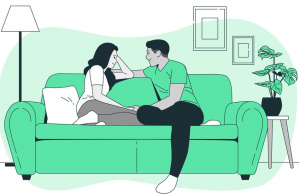Steps to Prepare for Marriage Counseling: A Simple Guide
By Prapoorna M
Last Updated: May 31, 2024
Prepare for Marriage Counseling: Have you ever wondered if there’s a way to strengthen your marriage, even before major problems arise? Marriage counseling is one of the most effective tools for building a healthy and happy relationship. Preparing for it can make all the difference in creating a successful experience.
Taking the time to prepare for marriage counseling ensures that you and your partner are ready to make the most out of the sessions. It’s not just about fixing problems; it’s also about enhancing communication, understanding each other better, and growing together as a couple. Whether you’re dealing with specific issues or just want to improve your relationship, being well-prepared for counseling can help you unlock the full potential of this beneficial process.
Discuss Your Goals Together
When preparing for marriage counseling, it’s crucial to set clear goals together as a couple. Marriage counseling preparation involves understanding what you want to achieve and how you envision your relationship improving.
Getting ready for marriage counseling isn’t just about focusing on the problems you want to solve. It’s also about exploring the positive changes you’d like to see in your relationship. Setting shared goals can help you focus your therapy sessions and ensure that both partners are working towards a common vision for the future.
Common Goals for Marriage Counseling
Here are some examples of goals couples often set for therapy:
- Improving Communication: Many couples seek therapy to enhance their communication skills, allowing them to express their needs and concerns more effectively.
- Building Trust: If trust has been broken, couples may focus on rebuilding it through open and honest dialogue.
- Enhancing Intimacy: Improving emotional and physical intimacy is a common goal for couples who want to deepen their connection.
- Resolving Conflicts: Learning to resolve conflicts in a healthy and productive way can transform how couples handle disagreements.
- Strengthening Partnership: Some couples want to improve their teamwork and support for one another in daily life.
By aligning on these or other goals, you can enter counseling with a clear focus. This helps both you and your therapist understand what areas to concentrate on, making therapy more effective and meaningful.
Also Read: Strengthen Your Marriage: Premarital Counseling Benefits
Find the Right Therapist
Finding the right therapist is crucial when preparing for couples therapy. The right therapist will not only make you feel comfortable but also guide you through your relationship journey effectively. It’s essential to invest time in finding someone you both connect with, as this can greatly impact how successful your therapy sessions are.
The Importance of Compatibility
The relationship between you and your therapist should be based on trust and mutual respect. A compatible therapist will understand your needs and facilitate open communication between you and your partner. This alignment can help create a safe environment where you feel comfortable expressing your thoughts and feelings.
Read more: How to Find the Right Marriage Counsellor?
Tips for Finding a Therapist
Here are some tips to consider when searching for a therapist:
- Check Qualifications: Look for licensed professionals with experience in couples therapy. Certifications like Licensed Marriage and Family Therapist (LMFT) or Licensed Professional Counselor (LPC) indicate specialized training.
- Read Reviews: Look at reviews or ask for recommendations from trusted friends or family members. Reviews can provide insights into the therapist’s style and effectiveness.
- Schedule Consultations: Many therapists offer initial consultations where you can discuss your concerns and goals. This helps you gauge whether the therapist is a good fit.
- Evaluate Compatibility: Both partners should feel comfortable with the therapist. Consider factors like communication style, empathy, and cultural sensitivity when evaluating compatibility.
Explore more on our article Online Marital Counselling
Researching and Scheduling Consultations
Once you’ve identified potential therapists, take the time to schedule consultations. These initial meetings allow you to explore the therapist’s approach and see if it aligns with your expectations. Remember, it’s okay to meet with several therapists before making a decision. Finding a therapist who fits well with both of you can set the stage for successful sessions.
Keep an Open Mind
When it comes to preparation for relationship counseling, keeping an open mind is essential. Marriage counseling works best when both partners are open to new perspectives and willing to explore different solutions.
Encouraging New Perspectives
Couples often come into therapy with their own viewpoints, and it’s natural to have specific ideas about what might be wrong or how to fix it. However, being open to your partner’s perspective and the therapist’s guidance can help you discover new ways to approach your relationship.
Addressing Common Stigmas
Therapy has long been stigmatized, but it’s important to remember that seeking help is a sign of strength, not weakness. Common misconceptions about therapy include:
- Only “crazy” people go to therapy.
- Couples counseling is a last resort before divorce.
- The therapist will take sides.
These stigmas can prevent couples from seeking the help they need. However, therapy is about growth, understanding, and developing healthier relationships.
Benefits of an Open-Minded Approach
An open-minded approach to marriage counseling allows couples to:
- Improve Communication: Open-mindedness fosters better communication and understanding.
- Explore New Solutions: Being open to new ideas can help you discover innovative ways to address issues.
- Build Trust: Openness creates a safe space for honest discussions, which builds trust.
By taking steps to prepare for marriage counseling with an open mind, you set the stage for productive sessions and positive changes. If you’re ready to embrace new perspectives, Wellness Hub offers supportive and professional marriage counseling services to help you along the way.
Reflect on Individual and Relationship Dynamics
One of the best tips for preparing for marriage counseling is to take time to reflect on both your individual behavior and your relationship patterns. Understanding your role in the relationship can help you approach therapy with a clearer perspective.
Reflecting on Personal Behavior
It’s beneficial to think about your actions and how they impact your relationship. Self-reflection helps you identify areas where you may need to improve or change. Ask yourself:
- How do I communicate when I’m upset?
- Do I listen to my partner’s needs?
- Am I contributing positively to the relationship?
Reflecting on Relationship Patterns
Next, consider the dynamics of your relationship. Patterns often develop over time and can influence how you and your partner interact. Some questions to consider include:
- What issues tend to cause conflict?
- How do we resolve disagreements?
- What patterns could be hindering our happiness?
Understanding Each Other’s Perspectives
Taking time to understand each other’s perspectives can enhance your connection and make therapy more effective. Recognizing and validating your partner’s feelings fosters empathy and can open the door for healthier communication.
Questions for Reflecting on Your Relationship
| Area of Reflection | Questions |
|---|---|
| Communication | – How do we communicate when we’re upset? – Are we listening to each other’s needs? – Do we feel understood during conversations? – How can we improve our communication skills? |
| Trust | – In what ways do we show trust? – Have there been any trust issues in our relationship? – How do we rebuild trust when it’s broken? – How can we foster more trust in our relationship? |
| Conflict Resolution | – How do we handle disagreements? – Do we resolve conflicts in a healthy manner? – How do we avoid escalating arguments? – What strategies can we use to resolve conflicts? |
| Intimacy | – How do we express love and affection? – Are we satisfied with our level of intimacy? – How can we enhance emotional and physical intimacy? – Are we comfortable discussing our needs and desires? |
Know more: Philophobia: Fear of Relationships – What to do?
Prepare to Be Honest and Vulnerable
If you’re wondering how to prepare for marriage counseling, one of the most important things to do is to prepare to be honest and vulnerable during therapy. Being truthful and open is key to effective therapy and can lead to meaningful breakthroughs in your relationship.
Being Honest in Therapy
Honesty is crucial when it comes to marriage counseling. It’s important to communicate openly about your feelings, needs, and concerns. Holding back or sugar-coating issues can prevent the therapy process from being effective.
The Importance of Vulnerability
Being vulnerable in therapy means being open to sharing your deepest thoughts and emotions. While this can be intimidating, it’s an important step in building intimacy and trust. Vulnerability allows you to address underlying issues and fosters a stronger connection with your partner.
The Role of Trust in Effective Therapy
Trust is a foundational element of effective therapy; when you and your partner trust each other and your therapist, it creates a safe space for open communication. This environment encourages both partners to express themselves honestly and work together towards positive change.
Establish Privacy Expectations
When preparing for marriage counseling, one key step is establishing your privacy expectations. If you’re curious about what to do before marriage counseling, discussing how you want to handle privacy can set the stage for a more comfortable and secure therapy experience.
Discussing Privacy Preferences
It’s important for couples to agree on how much information they want to share about their therapy sessions. Some couples may prefer to keep things private, while others might be more open about discussing their experiences with friends or family. Having a conversation about your preferences can prevent misunderstandings and ensure that both partners feel respected.
The Therapist’s Confidentiality Obligation
Remember that therapists are bound by confidentiality obligations, meaning they cannot share what happens in your sessions without your consent. This creates a safe space where you can speak openly and honestly without worrying about your privacy being breached. It’s always a good idea to clarify the therapist’s confidentiality policy during your initial consultation.
The Importance of Unified Communication
Unified communication about therapy can prevent conflicts and foster trust. If you both agree on what to share and what to keep private, it can strengthen your partnership and make therapy more effective. Unified communication shows that you’re working together towards a common goal and respecting each other’s boundaries.
Commit to the Process
One of the best ways to prepare for marriage counseling is to commit fully to the process. If you’re wondering how to prepare for couples therapy, understanding the importance of consistent participation and being patient with the process can make a huge difference in the effectiveness of your therapy.
The Importance of Commitment
Marriage counseling works best when both partners are fully committed. This means attending sessions regularly, being open during therapy, and actively engaging in the process. Commitment shows that you’re serious about improving your relationship and willing to put in the effort needed to make positive changes.
Consistent Participation
Consistent participation is key to effective therapy. It’s important to attend sessions regularly and to be fully present during each meeting. Skipping sessions or being distracted can hinder progress and make it difficult to address important issues. Make therapy a priority and be consistent in your participation.
Change Takes Time
It’s also important to remember that change takes time. Expecting instant results can lead to frustration and disappointment. Instead, focus on gradual progress and be patient with the process. Therapy is about building a stronger foundation for your relationship, and this often requires time and effort.
Plan for After the First Session
One of the key steps in preparing for marriage counseling is planning for what comes after the first session. If you’re curious what are the steps to prepare for marriage counseling, taking time to reflect, communicate, and maintain teamwork after each session is crucial.
Reflection Time
After your first session, take some time individually and as a couple to reflect on what you discussed. Reflection helps you process the information and insights gained during therapy. Consider journaling your thoughts or talking with your partner about what stood out to you during the session.
Open Communication
Encouraging open communication about your therapy experiences can enhance the effectiveness of counseling. Discuss what you liked, what surprised you, and what you might want to explore further in future sessions. Open communication builds trust and ensures that both partners are on the same page about the therapy process.
Continued Teamwork
Highlighting the benefits of continued teamwork can strengthen your partnership and make therapy more effective. Approach counseling as a team effort, working together to address challenges and improve your relationship. Continued teamwork fosters a supportive environment where both partners feel valued and understood.
Comparison of Therapy Outcomes With and Without Preparation
| Aspect of Therapy | With Preparation | Without Preparation |
|---|---|---|
| Engagement | High engagement | Low engagement |
| Progress | Faster progress | Slower progress |
| Satisfaction | Greater satisfaction | Less satisfaction |
| Communication | Improved communication | Poor communication |
| Conflict Resolution | More effective conflict resolution | Ineffective conflict resolution |
| Trust | Stronger trust | Weaker trust |
| Intimacy | Enhanced intimacy | Decreased intimacy |
| Consistency | Regular participation | Inconsistent participation |
Conclusion
Preparing for marriage counseling involves several important steps. These include discussing your goals together, finding the right therapist, keeping an open mind, reflecting on your relationship, and being honest and vulnerable. It’s also important to establish privacy expectations, commit to the process, and plan for after the first session. Doing these things can help you have a successful counseling experience.
By being proactive in your relationship and approaching therapy with dedication and openness, you can build a stronger partnership. If you need support and guidance, Wellness Hub offers resources and counseling services to help you. Being prepared for marriage counseling can make a big difference in the effectiveness of your sessions and the strength of your relationship.
Frequently Asked Questions:
1. How do I prepare for marriage counseling?
Preparing for marriage counseling involves discussing your goals as a couple, finding the right therapist, keeping an open mind, reflecting on individual and relationship dynamics, being honest and vulnerable, establishing privacy expectations, committing to the process, and planning for after the first session. These steps can help you have a successful counseling experience.
2. What should I expect during marriage counseling sessions?
During marriage counseling sessions, you can expect open and honest discussions about your relationship. Your therapist will help guide you and your partner through various issues, helping you communicate better, understand each other’s perspectives, and work towards common goals.
3. How can I make the most out of marriage counseling?
To make the most out of marriage counseling, it’s important to be open, honest, and committed to the process. Consistent participation and being patient with the process are key. Reflecting on sessions and communicating openly about your therapy experiences can also enhance the effectiveness of counseling.
4. How do I find the right therapist for marriage counseling?
Finding the right therapist for marriage counseling involves checking qualifications, reading reviews, scheduling consultations, and evaluating compatibility. It’s important that both partners feel comfortable with the therapist, as this creates a safe environment for open communication.
5. What are some common goals for marriage counseling?
Common goals for marriage counseling include improving communication, building trust, enhancing intimacy, resolving conflicts, and strengthening the partnership. Setting shared goals helps focus therapy and ensures that both partners are working towards a common vision for the future.
6. How long does marriage counseling usually take?
The duration of marriage counseling varies depending on the issues being addressed and the goals of the couple. Some couples see improvements in a few sessions, while others may need several months of therapy. It’s important to be patient and committed to the process, as meaningful change often takes time.
7. Is marriage counseling only for couples with serious problems?
No, marriage counseling is beneficial for all couples, whether they have serious issues or just want to improve their relationship. Counseling can help couples strengthen their connection, improve communication, and address any concerns they may have, making it valuable at any stage of a relationship.
8. How much does marriage counseling cost?
The cost of marriage counseling varies depending on factors like location, therapist qualifications, and session length. Some therapists offer sliding scale fees based on income, while others may accept insurance. It’s a good idea to discuss fees and payment options with potential therapists before starting counseling.
9. How can we prepare for couples therapy together?
To prepare for couples therapy together, start by discussing your goals for therapy and what you hope to achieve. It’s also important to choose a therapist you both feel comfortable with, set realistic expectations, and keep an open mind. Being honest and supportive of each other throughout the process can also help you make the most out of therapy.
10. What are the benefits of marriage counseling?
The benefits of marriage counseling include improved communication, increased understanding, enhanced intimacy, better conflict resolution, and a stronger partnership. Counseling can help couples address and overcome challenges, build trust, and create a healthier, more fulfilling relationship.
About the Author:
Prapoorna Mangalampalli
M.Sc., M.A., (Dual Masters in Psychology & English) – Counselor (6+ years of experience)
Prapoorna armed with a passionate dedication fueled by dual Master’s degrees in Psychology and English, Prapoorna sheds light on and elevates human experiences. Over 6+ years of experience fuel her insightful approach to counseling, offering profound empathy and guidance across diverse areas like online, marital, relationship, child, family, and career counseling.
At Wellness Hub, she thrives in a team environment that values innovation, compassion, and achieving results for their clients.
Connect with Prapoorna to learn how she can help you or your loved one find their voice and build a brighter future.
Book your Free Consultation Today
Parent/Caregiver Info:
Client’s Details:
* Error Message









